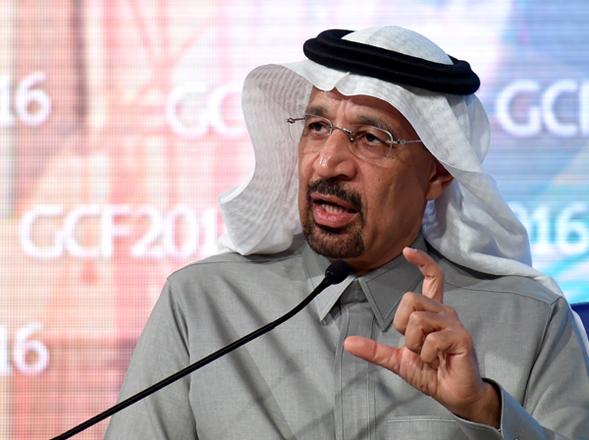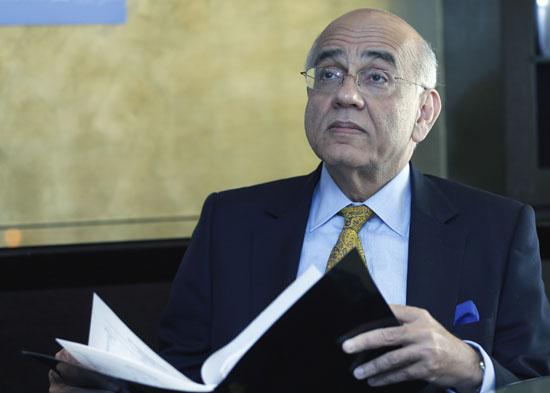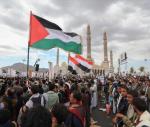You are here
Saudi shake-up rolls on with big reshuffle of economic posts
By Reuters - May 07,2016 - Last updated at May 07,2016

This file photo taken on January 25, 2016, shows Khalid Al Falih, the chairman of Saudi state oil giant Aramco, addressing the 10th Global Competitiveness Forum on January 25, in the capital Riyadh (AFP photo)
RIYADH — Saudi Arabia's King Salman on Saturday replaced his veteran oil minister and restructured some big ministries in a major reshuffle apparently intended to support a wide-ranging economic reform programme unveiled last week.
The most eye-catching move was the creation of a new energy, industry and natural resources ministry under Khaled Al Falih, chairman of the state oil company Aramco. He replaces the 80-year-old oil minister Ali Al Naimi, in charge of energy policy at the world's biggest oil exporter since 1995.
But major changes were also made to the economic leadership, with Majed Al Qusaibi named the head of the new commerce and investment ministry, and Ahmed Al Kholifey made governor of the Saudi Arabian Monetary Agency (SAMA), the central bank.
The changes, announced in a series of royal decrees, go far beyond King Salman's previous reshuffles since he became king in January last year, and also put the stamp of his son, Deputy Crown Prince Mohammed Bin Salman, author of the Vision 2030 reform programme, on the government.
Prince Mohammed's programme has been presented as a sweeping rethink of the entire way that Saudi Arabia's government and economy will function to prepare for a future that is less dependent on oil income.
Some of the most important elements of the plan, which will be fleshed out in coming weeks, involve creating a massive sovereign wealth fund, privatising Aramco, cutting energy subsidies, expanding investment and streamlining government.
The plan also seeks to boost revenues by increasing the number of foreign pilgrims outside the main annual Haj, and encouraging Saudis to spend money at home by creating more entertainment opportunities.
Rapid rise
Prince Mohammed's dizzying rise since his father became king has astonished Saudis and, in becoming second in the line of succession behind his cousin, he has swept past dozens of other contenders.
Naimi, for his part, has for two decades been the most influential man in world energy, able to move oil markets with a mere word, but his influence had appeared to decline sharply under King Salman. He has been appointed as an adviser to the royal court.
Falih has long been seen as a leading contender to replace him. Like Naimi a career Aramco man, he was the chief executive of the oil giant from 2009 until last year, when he was made company chairman and health minister.
Whether he will play the same role as Naimi did in the Organisation for Petroleum Exporting Countries (OPEC), or in crafting Saudi oil policy, remains unclear, however.
The new SAMA governor, Kholifey, is promoted from deputy governor for research and international affairs. He replaces Fahd Al Mubarak, who has held the post since December 2011.
A veteran of SAMA and graduate of King Saud University in Riyadh and Colorado State University, Kholifey had also served from 2011 to 2013 as executive director for Saudi Arabia at the International Monetary Fund in Washington.
He is set to take over a central bank with more limited functions than it had under his predecessor. While SAMA remains responsible for monetary policy, it will no longer act as the country's biggest sovereign wealth fund because a larger one is being created under the Vision 2030 reforms.
Quest for efficiency
Finance Minister Ibrahim Alassaf, who has held the post since 1996, remains in place. However, other economic departments have over the past year taken over some of his ministry's responsibilities.
Saturday's decrees broke up the water and electricity ministry, with the water portfolio added to a new Environment, water and agriculture ministry, and electricity added to the new energy ministry.
Those changes may help Saudi Arabia to cut subsidies, reduce domestic power and water consumption, make sure that energy pricing meshes clearly with industrial development goals, and that nuclear and solar policy are more carefully integrated.
"The merging of ministries is opening the door to efficiency gains that the government is keen to enforce," said John Sfakianakis, a former adviser to the government and the head of economy at the Jeddah and Geneva-based Gulf Research Centre.
Two other senior economic figures, royal court adviser Yasir Al Rumayyan and former SAMA governor Mohammed Al Jasser, were appointed advisers to the secretariat general of the Cabinet.
Tawfiq Al Rabeeah, formerly commerce minister, was appointed health minister in place of Falih, Suleiman Al Hamdan was appointed transport minister, and the pilgrimage ministry was renamed the Hajj and umrah ministry.
The royal decrees also merged the ministries of labour and of social affairs into a new department, and created a new Commission for Recreation and Culture.
Related Articles
RIYADH – The new energy minister of Saudi Arabia, the world's biggest oil exporter, on Sunday pledged continuity in the kingdom's oil policy
Gulf oil exporters must reduce spending, including subsidies and diversify their economies to cope with lower revenues caused by the sharp drop in crude prices, the International Monetary Fund (IMF) said.
DUBAI/RIYADH — A shake-up of Saudi Arabia's oil leadership by King Salman has introduced a new element of unpredictability to its energy pol
















